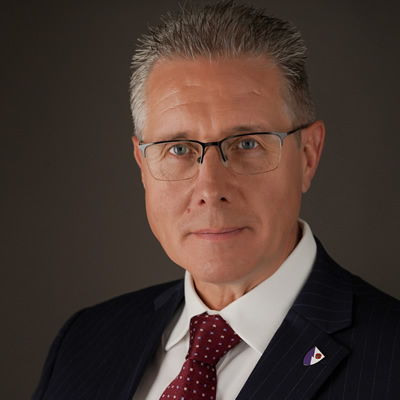Culture in the Emergency Department

RCEM CEO, Gordon Miles
What is the culture of the Emergency Department?
Organisational culture in Emergency Medicine (EM) has emerged as a significant contributory factor to workplace behaviour and performance, including patient outcomes, and patient and staff experience. The Emergency Department (ED) is a high-stress, high-paced environment that interfaces with the community and the rest of the hospital so it is unsurprising that a unique ‘subculture’ has evolved – one that is recognised by those who work in ED and those who interface with it.
We have recently formed an ‘Improving Culture in EM’ Working Group to explore the issues in an open and honest way – and to see if the College can meaningfully add to the body of knowledge and best practice on what the culture of an ED should ideally be.
This work is in response to a need identified from a range of sources, which flagged an urgent requirement to improve interpersonal behaviours within EDs, including the relationships that EM teams have with other teams in the hospital.
So, what is the problem we are trying to solve?
A growing body of evidence over recent years has highlighted concerns over inappropriate behaviour being experienced by some post graduate doctors training in the specialty and wider NHS. For example, the GMC National Training Survey 2014: bullying and undermining identified that 13.6% of doctors from all specialties who responded (n=49,994) had reported witnessing bullying at work with 8% reporting that had experienced bullying.
Our specialty has historically scored worse than other specialties on being a supportive environment, and in relation to bullying and undermining. Over the past decade the data remained relatively static, hence the desire for the College to act. We shared a press release when the GMC published the latest data in 2023 highlighting that:
- More than a quarter of all doctors in training say they have experienced micro-aggressions, negative comments, or oppressive body language from colleagues. In EM, those who have experienced these poor behaviours rose to one-third.
- More than one in 10 trainee doctors reported they had felt ‘intentionally humiliated’ in front of others.
- More than one in five of foundation trainees said they had been blamed for something they did not do in their current post.
- Only six in 10 said they would feel confident about reporting discrimination without fear of adverse consequences.
Despite the negatives, many trainees rated their clinical supervision (86%) and quality of teaching (74%) highly, and eight out of 10 said they had a good or very good experience in their post.
While these ratings are positive, two-thirds of trainees across specialties are at high or moderate risk of burnout (the highest this metric has ever recorded). EM has the highest level, with more than one-third of EM trainees at high-risk of burnout.
In response to the GMC Training survey, the Co-Chairs of the Emergency Medicine Trainees’ Association (EMTA), Dr Lara Somerset and Dr Hannah Baird said:
“EMTA is working with the College and its RespectED campaign, taking action to tackle bullying, harassment, and undermining behaviours and to equip our members and healthcare workers to speak up and challenge these behaviours and toxic cultures.
“To see the prevalence of these experiences shows how far the NHS still must go to tackle toxic behaviours and culture and wider discrimination.
“No-one goes to work to be mistreated, if unaddressed these highly skilled and competent trainees may feel they have no option but to leave, compounding wider, pre-existing workforce issues in Emergency Medicine and the NHS as a whole.
“NHS Trusts and Boards across the UK need to ensure trainees are protected and supported. Trainees must have no fear in raising issues such as these, or concern about colleagues.
“It is also deeply concerning to read that over one-third of EM trainees are at a high-risk of burnout. Emergency Departments can be very stressful and hostile places to work, and assurances must be made that departments, trainers, trusts and supporting organisations will provide adequate support for anyone struggling.”
There is evidence that a significant number of post graduate doctors in training are experiencing some form of adverse culture in their workplace, however the evidence doesn’t fully tell us where the root cause of this lies.
The Breaking the Silence Report and Surviving in Scrubs campaign has highlighted the issue of gender based discrimination, harassment and sexual assault in healthcare. Those behind the campaign include Chelcie Jewitt, an emergency physician. The campaign website includes testimony from those working in EDs who have experienced gender-based discrimination. It lists testimonies from women who have suffered absolutely horrific experiences from criminal activity such as sexual assault – including rape, as well as a range of other deeply traumatising experiences. The fact that these behaviours have been allowed to exist and persist is shameful and concerning.
Gender-based discrimination is not the only ingredient that nurtures a toxic culture. During the Covid-19 pandemic, RCEM surveyed members about the availability of PPE and PPE training. The results unveiled some alarming race and ethnicity-based disparities, with Black, Asian, and Minority Ethnic (BAME) members reporting a relative disadvantage in relation to the availability of PPE and training in the use of PPE. The full impact of this remains undocumented however the statistics tell us that over two-thirds of health care workers and 94% of all doctors who sadly died from Covid in the first wave of the pandemic were BAME.
The environment that enables sexism to persist and flourish is the same environment that gives racism the green light, and of course homophobia, disability discrimination and other types of discrimination.
I could go on, as there are a range of sources that point to the fact that despite all the positives of working in EM, we are not immune from a disease that appears to be infecting medicine generally – that is bullying and discrimination. Which leads the College to ask how we can improve the culture in EM?
What is culture?
Before I go on to discuss what might be done, it is worth taking a moment to consider what culture is. Personally, I prefer the definition of organisational culture as simply – ‘the way we do things around here’.
Denise Lee Yohn, an organisational development expert writing in the Harvard Business Review, defined culture as: “the ways people in the organisation behave and the attitudes and beliefs that inform those behaviours (i.e., ‘the way we do things around here’) – including formal, stated norms, as well as implicit ways people work and interact. At many organisations there is a gap between the existing culture and the ‘desired’ culture — the culture needed to support and advance the company’s goals and strategies. In a new culture-building model, everyone is responsible for cultivating the desired culture.”
This perhaps explains the issue we face – if it is the responsibility of everyone then it is also no-one’s responsibility. Denise Lee Yohn talks about the role of various actors in an organisation as being influential on the culture which I have paraphrased below:
Senior leadership, the board, CEO, directors, the management team all help guide the definition and development of the culture and should be ensuring that it aligns with organisational goals and meets the needs of all stakeholders.
Human Resources departments should be designing employee experiences that interpret and reinforce the desired culture through the processes of recruitment, retention, and advancement.
The approach to risk management, compliance and ethics is also a factor – processes such as whistleblower programmes, and systems such as compliance monitoring reinforce and align the culture.
The wider employee base also play a part – the way people behave and norms that they have established reinforce the culture.
If we were to follow a traditional approach, we could simply highlight this as an employer issue to solve and hand the problem back to the NHS, which is after all the employer. We do not feel that is the right approach, particularly at this time of worsening NHS pressures and staff shortages which are compounding these problems. We cannot stand by and allow our membership to experience ongoing negative behaviours without trying to help tackle it.
So, if culture is ‘the way we do things around here’, and noting we have a problem with some aspects of it in EM, the question becomes – what should we do about it?
College leadership
The College has been gathering and evaluating data, and we have reports from a range of sources about the challenges being experienced from EMTA, EMSAS, our EDI Committee and our Gender Equity Committee.
Having thought about what to do, our Council commissioned work which led to RCEM launching the RespectED campaign in 2021. This included the production of an educational video aimed at our membership.
But more can and should be done, so we formed a Working Group drawing together a diverse team from across the College to develop and implement more impactful and long-lasting strategies to tackle this issue.
What are the next steps?
The Working Group has had its first meeting and is considering next steps. Our plans are in the early stages of coming together so if you have any views on what we should do then please do email me at the address below.
We are exploring the current climate and envisage that a sustained campaign needs to be developed, which is expected to include the following:
- A review of RCEM material on tackling inappropriate behaviour and pulling this all together into one place as a resource for members.
- Ensure our Code of Conduct remains relevant for our members.
- Develop and signpost relevant training for members, noting that many Trusts source their own training on workplace behaviour.
- Promote some interventions and toolkits that might help those suffering from inappropriate behaviour such as Active Bystander Intervention Training.
- Raise awareness by actively promoting this issue in a way that those who are not on the receiving end of the behaviour come forward as allies for those who are.
- Develop a framework for lobbying on this issue so the College can advocate at the most senior levels for change in the NHS.
- Examine the culture within RCEM itself and highlight areas for improvement.
Achieving cultural change within any organisation is not easy, never mind in a huge organisation such as the NHS. It will be challenging, complex and nuanced, especially as each hospital may have its own slightly different culture. We are ready for the challenge and are embarking upon a journey to raise awareness, increase training, hold organisations – including our own – to account to support our membership.
I do hope you will want to help. I would welcome your thoughts and contributions – you can influence the direction this programme takes if you wish.
Gordon Miles
CEO
gordon.miles@rcem.ac.uk



0 Comments